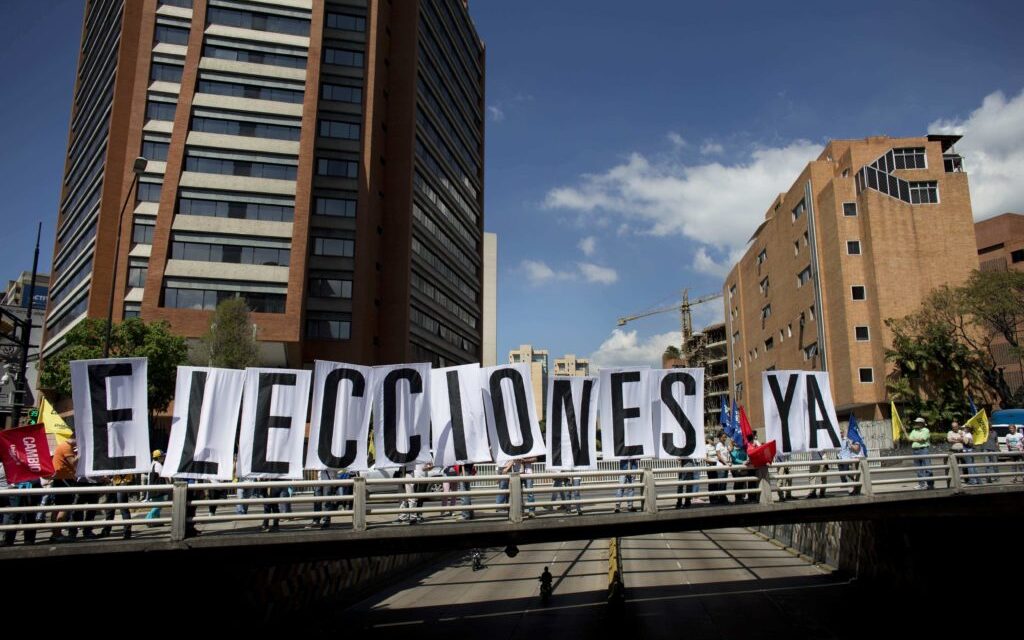Recent weeks have seen credible reports of quiet talks on electoral reform in Venezuela. While success is not guaranteed, this week’s extension of a key deadline in the process of naming a new National Electoral Council (CNE) suggests negotiations are progressing.
WOLA is tracking these developments closely. On Tuesday, March 16 (see video), we held a public discussion with members of the Foro Civico Nacional, a non-partisan civil society coalition including NGOs, business associations, faith groups, and independent labor unions. The event hosted electoral experts Griselda Colina, Eugenio Martinez, and Roberto Picon, all three of whom are among the 15 individuals the Foro Civico has presented as candidates for CNE. Below are a few key takeaways for U.S. policymakers.
- The Foro Civico coalition emerged in support of signs of ongoing talks. There have been reports of negotiations around a new CNE in Venezuela since February. Notably, these talks are said to involve opposition actors outside of the National Assembly dominated by the ruling PSUV. Former opposition presidential candidate Henrique Capriles and former National Assembly Vice President Stalin Gonzalez are reportedly involved in these negotiations, which may explain why Juan Guaido has recently begun publicly calling to have some influence in CNE talks as well. On March 16 the Comite de Postulaciones, the committee in the PSUV-dominated National Assembly, announced that it would extend the deadline to present candidates to the CNE by 10 days. This has been interpreted by some analysts as a sign that negotiations are ongoing.
- The Foro Civico isn’t seeking to replace or sideline the political parties. In remarks from all three presenters, and at the Foro Civico’s launch last month, its spokespeople have repeatedly insisted that they do not want to supplant political actors. Instead, they see their role as vital to pressuring for political elites (in both the opposition and the Maduro regime) to seek a peaceful, democratic solution rather than insisting on maximalist agendas that maintain the current stalemate. As Griselda Colina noted in the WOLA forum, the objective of this civil society initiative is to “create a third side” that can pressure for progress in credible negotiations moving forward.
- Rather than focusing on a 2-2-1 CNE, negotiations should take into account substitute rectors, which have important technical oversight. According to Venezuela’s Organic Law of the Electoral Power (LOPRE), the CNE is made up of five main rectors and three substitutes that are incorporated into subordinate bodies. In previous negotiations, the opposition has sought an even split of the main five rectors, meaning two rectors decided from each side and one that both agree on. However, in their presentations, Roberto Picon and Eugenio Martinez argue that negotiations should take into account the three substitutes, as in some cases they have more political and technical decision-making power than the main rectors themselves.
- Political actors will have to negotiate a range of technical aspects of voting, not just the CNE. While a more credible CNE is key to reestablishing Venezuelans’ faith in elections, other elements of the process are just as important. In Tuesday’s WOLA event, the three elections specialists laid out multiple aspects of Venezuela’s electoral infrastructure that should be revised. One is the newly-updated electronic voting system, which was designed and sold by the now-sanctioned biometric company Ex-Cle. In order for any vote to be credible, this system will need to be thoroughly evaluated by independent experts with access to the entire vote tally process. According to Eugenio Martinez, such a review could take up to six months. It will be just as important that Venezuela’s electoral registry, the country’s database of registered voters, is updated (which hasn’t happened since 2015) and audited (which hasn’t been done since 2005) as well. Martinez estimates that 2.6 million new Venezuelan voters will need to be incorporated into the registry, and that some 1.6 million will have to update their polling sites.
- Credible elections will require fair rules governing the entire electoral process, including registering parties, presenting candidates, and campaigning. On top of the CNE and technical details, electoral negotiations will have to allow for opposition parties to reclaim their recognition in the country’s legal system. Three of the four main parties have been essentially stripped of their autonomous leadership by the Supreme Court, and dozens of high -profile politicians are unable to participate in elections due to suspect court rulings by a judicial branch that lacks independence. Unless these concerns are addressed, it will be difficult for the international community to recognize any elections in the country.
Ultimately, the Foro Civico seeks to have an advocacy impact beyond whatever is decided in ongoing electoral negotiations. They have a view of partial or sectoral negotiations that is quite different from public statements by the U.S. Venezuela Affairs Unit in Bogota. Rather than seeing negotiations on access to a COVID vaccine, private sector reforms, or on electoral conditions as something that undermines the prospect for a wide-ranging negotiated solution, these actors believe in pursuing a strategy that can link partial agreements together in a way that builds momentum for a comprehensive political agreement—what the group calls “A National Democratic Agreement.”



